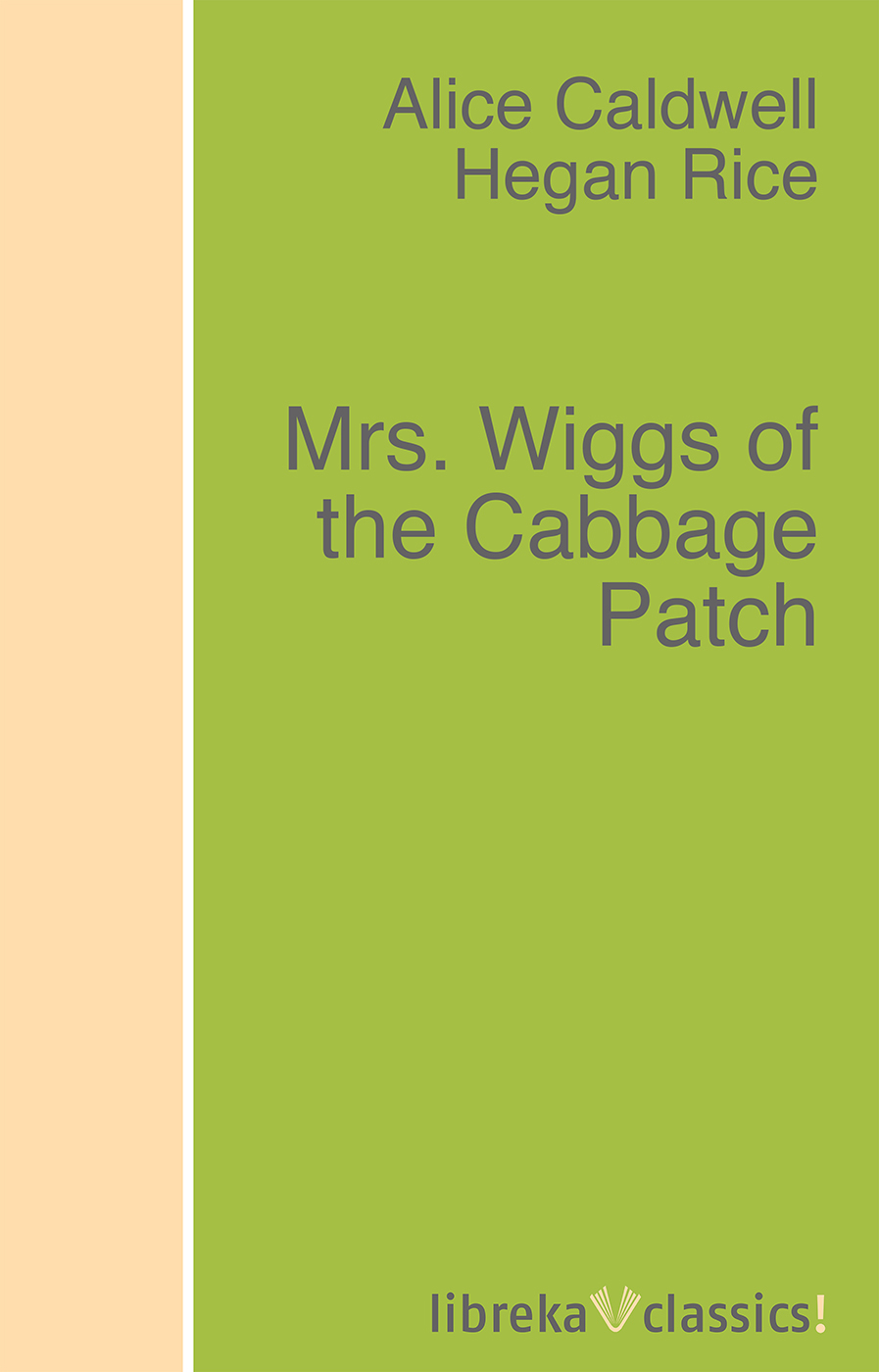
Полная версия
Mrs. Wiggs of the Cabbage Patch


Titel: Mrs. Wiggs of the Cabbage Patch
von Oliver Goldsmith, Samuel Pepys, William Dean Howells, John Burroughs, William Harmon Norton, L. Mühlbach, Franklin Knight Lane, Walter Pater, Jonathan Swift, Augusta J. Evans, Trumbull White, Kathleen Thompson Norris, Matthew Arnold, Charles W. Colby, Shakespeare, James Fenimore Cooper, D. H. Lawrence, James Joyce, Ada Cambridge, Philip E. Muskett, Catherine Helen Spence, Rolf Boldrewood, Ernest Scott, Fergus Hume, H. G. Wells, Victor [pseud.] Appleton, Roald Amundsen, Max Simon Nordau, Henry David Thoreau, E. Phillips Oppenheim, Richard Wagner, Franz Liszt, Charlotte Mary Yonge, Charles Henry Eden, Charles Babbage, T. R. Malthus, Unknown, Joseph Ernest Morris, Robert Southey, Isabella L. Bird, Charles James Fox, Thomas Hariot, Cyrus Thomas, Bart Haley, Christopher Morley, Edgar Saltus, Marie Corelli, Edmund Lester Pearson, Robert Browning, John Aubrey, Benjamin Nathaniel Bogue, John McElroy, John Galsworthy, Henry James, Hamilton Wright Mabie, Mina Benson Hubbard, Elizabeth Cleghorn Gaskell, John Keble, Henry Lindlahr, Richard Henry Dana, Annie Wood Besant, Immanuel Kant, John Habberton, Baron Edward John Moreton Drax Plunkett Dunsany, T. B. Ray, Isabel Ecclestone Mackay, Frank C. Haddock, William John Locke, baron Arthur Léon Imbert de Saint-Amand, Ralph Centennius, United States, Library of Congress. Copyright Office, James Otis, George Hartmann, Sir Arthur Conan Doyle, George Gissing, John Henry Tilden, Thomas Wright, Frederick Samuel Dellenbaugh, Anonymous, J. Clontz, David Hume, Margot Asquith, Elmer Ulysses Hoenshel, Byron J. Rees, Lida B. McMurry, Georges Duhamel, Ramsay Muir, Edith Wharton, Charles Sturt, Lola Ridge, J. M. Stone, Annie Payson Call, Grant Allen, kniaz Petr Alekseevich Kropotkin, Steve Solomon, Isabel Moser, Aleksandr Sergeevich Pushkin, Horace W. C. Newte, Charles Darwin, Maurice Maeterlinck, Walter Bagehot, Henri Bergson, George Randolph Chester, John S. C. Abbott, L. Frank Baum, William T. Sherman, Philip Henry Sheridan, Friedrich Wilhelm Nietzsche, Ambrose Bierce, Ulysses S. Grant, F. Scott Fitzgerald, Alfred Lichtenstein, Abbot of Nogent-sous-Coucy Guibert, Nellie L. McClung, Alice Caldwell Hegan Rice
ISBN 978-3-7429-4235-7
Alle Rechte vorbehalten.
Es ist ohne vorherige schriftliche Erlaubnis nicht gestattet, dieses Werk im Ganzen oder in Teilen zu vervielfältigen oder zu veröffentlichen.
MRS. WIGGS OF THE CABBAGE PATCH
BY
ALICE CALDWELL HEGAN
NEW YORK . . MCMII
Copyright, 1901, by
THIS LITTLE STORY IS
LOVINGLY DEDICATED
TO MY MOTHER, WHO
FOR YEARS HAS BEEN
THE GOOD ANGEL OF
"THE CABBAGE PATCH"
CONTENTS
MRS. WIGGS'S PHILOSOPHY WAYS AND MEANS THE "CHRISTMAS LADY" THE ANNEXATION OF CUBY A REMINISCENCE A THEATER PARTY "MR. BOB" MRS. WIGGS AT HOME HOW SPRING CAME TO THE CABBAGE PATCH AUSTRALIA'S MISHAP THE BENEFIT DANCE
MRS. WIGGS OF THE CABBAGE PATCH
CHAPTER I
MRS. WIGGS'S PHILOSOPHY
"In the mud and scum of things
Something always always sings!"
"MY, but it's nice an' cold this mornin'! The thermometer's done fell up to zero!"
Mrs. Wiggs made the statement as cheerfully as if her elbows were not sticking out through the boy's coat that she wore, or her teeth chattering in her head like a pair of castanets. But, then, Mrs. Wiggs was a philosopher, and the sum and substance of her philosophy lay in keeping the dust off her rose-colored spectacles. When Mr. Wiggs traveled to eternity by the alcohol route, she buried his faults with him, and for want of better virtues to extol she always laid stress on the fine hand he wrote. It was the same way when their little country home burned and she had to come to the city to seek work; her one comment was: "Thank God, it was the pig instid of the baby that was burned!"
So this bleak morning in December she pinned the bed-clothes around the children and made them sit up close to the stove, while she pasted brown paper over the broken window-pane and made sprightly comments on the change in the weather.
The Wiggses lived in the Cabbage Patch. It was not a real cabbage patch, but a queer neighborhood, where ramshackle cottages played hop-scotch over the railroad tracks. There were no streets, so when a new house was built the owner faced it any way his fancy prompted. Mr. Bagby's grocery, it is true, conformed to convention, and presented a solid front to the railroad track, but Miss Hazy's cottage shied off sidewise into the Wiggses' yard, as if it were afraid of the big freight-trains that went thundering past so many times a day; and Mrs. Schultz's front room looked directly into the Eichorns' kitchen. The latter was not a bad arrangement, however, for Mrs. Schultz had been confined to her bed for ten years, and her sole interest in life consisted in watching what took place in her neighbor's family.
The Wiggses' house was the most imposing in the neighborhood. This was probably due to the fact that it had two front doors and a tin roof. One door was nailed up, and the other opened outdoors, but you would never guess it from the street. When the country house burned, one door had been saved. So Mrs. Wiggs and the boys brought it to the new home and skilfully placed it at the front end of the side porch. But the roof gave the house its chief distinction; it was the only tin roof in the Cabbage Patch. Jim and Billy had made it of old cans which they picked up on the commons.
Jim was fifteen and head of the family; his shoulders were those of a man, and were bent with work, but his body dwindled away to a pair of thin legs that seemed incapable of supporting the burden imposed upon them. In his anxious eyes was the look of a bread-winner who had begun the struggle too soon. Life had been a tragedy to Jim: the tragedy that comes when a child's sensitive soul is forced to meet the responsibilities of manhood, yet lacks the wisdom that only experience can bring.
Billy Wiggs was differently constituted; responsibilities rested upon him as lightly as the freckles on his nose. When occasion or his mother demanded he worked to good purposes with a tenacity that argued well for his future success, but for the most part he played and fought and got into trouble with the aptitude characteristic of the average small boy.
It was Mrs. Wiggs's boast that her three little girls had geography names; first came Asia, then Australia. When the last baby arrived, Billy had stood looking down at the small bundle and asked anxiously: "Are you goin' to have it fer a boy or a girl, ma?" Mrs. Wiggs had answered: "A girl, Billy, an' her name's Europena!"
On this particular Sunday morning Mrs. Wiggs bustled about the kitchen in unusual haste.
"I am goin' to make you all some nice Irish pertater soup fer dinner," she said, as she came in from the parlor, where she kept her potatoes and onions. "The boys'll be in soon, an' we'll have to hurry and git through 'fore the childern begin to come to Sunday-school."
For many years Sunday afternoon had been a trying time in the neighborhood, so Mrs. Wiggs had organized a Sunday-school class at which she presided.
"If there don't come Chris an' Pete a'ready!" said Asia, from her post by the stove; "I bet they've had their dinner, an' jes' come early to git some of ours!"
"Why, Asia!" exclaimed Mrs. Wiggs, "that ain't hospit'le, an' Chris with one leg, too! 'T ain't no trouble at all. All I got to do is to put a little more water in the soup, an' me and Jim won't take but one piece of bread."
When Jim and Billy came in they found their places at the table taken, so they sat on the floor and drank their soup out of tea-cups.
"Gee!" said Billy, after the third help, "I've drinken so much that when I swallers a piece er bread I can hear it splash!"
"Well, you boys git up now, an' go out and bring me in a couple of planks to put acrost the cheers fer the childern to set on."
By two o 'clock the Sunday-school had begun; every seat in the kitchen, available and otherwise, was occupied. The boys sat in the windows and on the table, and the girls squeezed together on the improvised benches. Mrs. Wiggs stood before them with a dilapidated hymn-book in her hand.
"Now, you all must hush talking so we kin all sing a hymn; I'll read it over, then we'll all sing it together.
'When upon life's billers you are tempest tossed,
When you are discouraged thinking all is lost,
Count yer many blessin's, name 'em one by one,
An' it will surprise you what the Lord hath done!'"
Clear and strong rose the childish voices in different keys and regardless of time, but with a genuine enthusiasm that was in itself a blessing. When they had sung through the three stanzas Mrs. Wiggs began the lesson.
"What did we study 'bout last Sunday?" she asked.
No response, save a smothered giggle from two of the little girls.
"Don't you all remember what the Lord give Moses up on the mountain?"
A hand went up in the corner, and an eager voice cried:

